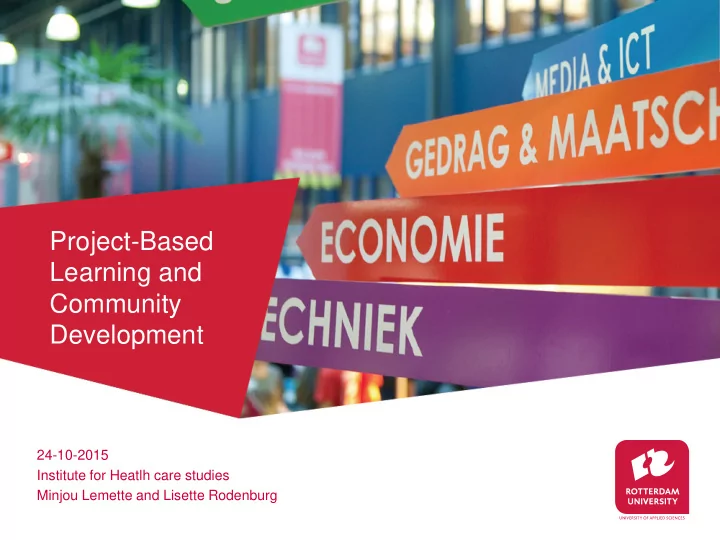

Project-Based Learning and Community Development 24-10-2015 Institute for Heatlh care studies Minjou Lemette and Lisette Rodenburg
Community Development Working with new competencies in the Netherlands Paradigm shift in the Netherlands, change from medical model thinking to more social and citizenship model thinking Awareness of legislation concerning citizen participation Occupational therapy on the crossroad of social welfare and medical care Community based care versus community development
Competency Empower to selfmanagement and participation
What does this mean for the students? Another way of thinking: Student recognises occupational needs within vulnerable citizens and/or groups in community Awareness of bottom-up approach Students are facilitators and coaches to empower citizens to self-management
Consequences for teachers? Parallel proces: Coaching role Empower students to selfmanagement Shift of thinking
Projects & PBL
Why community projects in Rotterdam? Life expectancy and experienced health conditions are lower than in the rest of the Netherlands Ageing population ---> growing demand for healthcare A shortage of healthcare workers asks for smart solutions to increase overall health level and create a social-economic strong city Source: (www.GGDRijnmond.nl , Healthcare policy Rotterdam).
Project-Based Learning (PBL) Innovative approach to learning that teaches a multitude of strategies critical for success in the twenty- first century Students drive their own learning through inquiry, as well as work collaboratively to perform research and create projects that reflect their knowledge The project is guided by an inquiry question that drives the research and allows students to apply their acquired knowledge Student choice is a key element of this approach
Project-Based Learning (PBL) Starts in second year Focus: more freedom for the student; ownership Means more uncertainty for both, students and teachers How ? Volunteer work Professional product Frame of reference: citizenship model
Examples of projects in the 2nd year
Empowerment within powerdistrict of Rotterdam Skill design in second year : In third semester each student will go to a primary schools for 4 hours a week On request of a teacher or internal supervisor the student will advise the teacher about a child with an occupational problem
Children’s zone Each District in Rotterdam Children's Zone of Rotterdam will be visited by a special Districtteam, who will also perform home visits to see the child. The Rotterdam ‘Children Zone’ is based on Harlem Children Zone from New York.
Project-Based Learning Third year Focus on international perspective, professional development and entrepreneurship Learning from international developments (Community) Projects within the framework of community development to support and facilitate participation Selfmanagement students; find their own project How? Contact with OT’s over the world Professional product Contact with contracters
De Ergotherapeut Mijn visie Interventies Rehabilitatiebenadering (IRB) - Critical Time Interventies (CTI) - Aanleren van vaardigheden Community Based Rehabilitatie (CB - - ADL - (Financiële) administratie - Planning - Huishoudelijke taken Ervaringen uit het buitenland - Homeless Health Outreach Teams ormatie en advies geven Nieuw Zeeland - Bij wonen, werk, vrije tijd - (F)ACT teams opgezet in Amerika - Invulling dagbesteding (ook in Nederland) - Arbeidstrajectbegeleiding - Coachen van vrijwilligers in een - Aan vrijwilligers, medewerkers, inloopcentrum voor dak- en omgeving thuislozen België - ENOTHE en WOFT 2010, Occupational Therapy in the futur Herstellen van rollen (rol voor ergotherapeut bij o.a. da en thuislozen) - Contacten met ouders - Contacten met kind(eren) - Opbouwen sociaal netwerk
Examples of projects third year Set up cycle project for immigrants Mobility scooter community project: development screening instrument and educational material City council project: investigate existing organisational structures to improve participation for citizens
Book of portraits; future dreams of young offenders who participated in a course for independent living I just want a pink Subaru, that’s all .. I ‘ve been through too many extreme incidents , just leave me alone. Let me be in antartica, there it will be peaceful…
Project-Based Learning Fourth year : Focus: graduation and professional development Minor Internship Thesis combined with the internship
Skills needed Mapping relevant resources and stakeholders (political and social) Students undertake initiatives to approach target groups in order to create and utilize opportunities Students have to negotiate with stakeholders and customers on an equivalent level
Outcome Learning responsibility, independence and discipline Motivation for the project is high Students are more focused and feel responsible for their project Students manage their own time and learning experiences Students learn to cope with complexity of society therefore they need the urge of collaboration , problem solving and communication skills
Pros Cons High motivation of students Find a balance between the demands of Citizens within organisations/ community and educational frames Authentic professional situations Timemanegement; education is stretched out over a period of time where they have to learn and produce results. Occupational Therapy ambassadors in Screening and monitoring the community projects/ networks will cost time and good project management Happy customers Follow up community projects costs time and organisation for effective implementation Students experience freedom and responsibility Students learn to create their professional network
Challenges Support among the team Getting students out of their comfort zone Program need to connect with the studentprojects (on time) Review of education
Do you recognize this proces? Which challenge do you face?
Questions???
Sources Mitham, M.D. ( 2014) Education as engine .Americain Journal of occupational therapy 68, 636-648. Bel, S. ( 2010) Project-Based Learning for the 21st Century: Skills for the Future. The Clearing House , 83: 39–43, 2010 Taylor & Francis Group. Leclair, L. (2010) Re-examining concepts of occupation and occupation-based models: Occupational therapy and community development . DOI: 10.2182/cjot.2010.77.1.3 2010 77: 15 Canadian Journal of Occupational Therapy
Recommend
More recommend